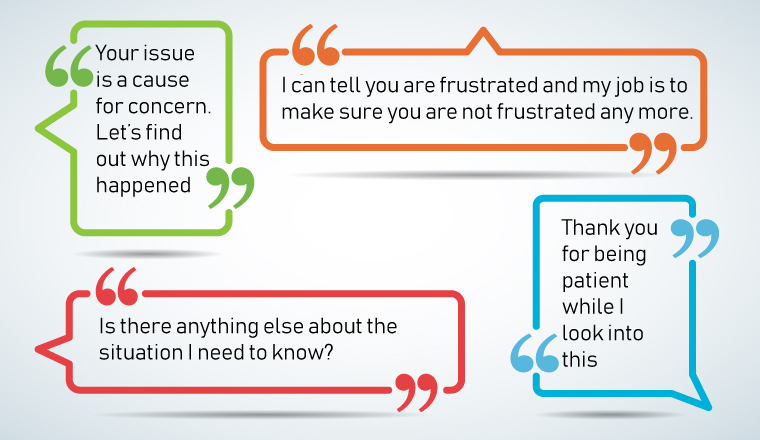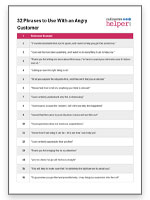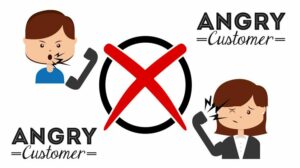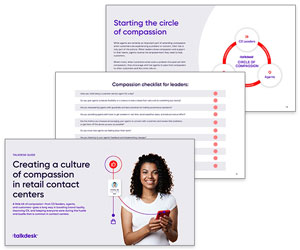It happens on a regular basis… Angry customers take out their frustration on your frontline agents. Understanding how to manage these interactions effectively can help resolve issues, build trust, and turn negative experiences into positive outcomes.
In this article, we’ve gathered seven practical tips – along with useful phrases and strategies – to help you confidently handle difficult customer interactions.
7 Tips to Handle an Angry Customer
If you wish to be successful in any business, you have to learn how to handle angry and disgruntled customers, who may not have received the level of service that they expected from the company that you are representing.
Before you devise a plan to cope with these difficult situations, it is important to try and understand the viewpoint from both sides. You are the initial point of contact with the angry customer and they are expressing their concerns about the company and not about you as an individual.
Listed below are seven important points and examples of how to assist a difficult customer, followed by guidelines to help you develop your own personal strategy for dealing with them.
1. Try Not to Take it Personally
Some great advice in to always remember that an angry customer isn’t angry at you personally. This can make it so much easier to deal with. We’re all human though, some workers find it upsetting, so there needs to be proper support and training in the workplace to help us cope.
Your aim should always be customer satisfaction, whatever the situation. How you achieve this is up to you based on your individual strengths and inter-personal skills.
Examples Statements:
- “It’s understandable that you’re upset, and I want to help you get this sorted out.”
- “I can see this has been upsetting, and I want to do everything I can to help you.”
- “Thank you for letting me know about this issue. I’m here to assist you and make sure it’s taken care of.”
Contributed by: Gavin
2. Reassure the Customer
One of the first and most important things to do is reassure the customer that you are listening. Even if you won’t be able to give them exactly what they want, they need to be sure that their message is getting across.
The sad fact is that many customers will have had negative experiences with contact centres before. You need to demonstrate that they have your attention and that you really intend to help.
Examples of Reassuring Statements:
- “Calling us was the right thing to do”
- “I’ll let you explain the situation first, and then we’ll find you a solution”
- “Please feel free to tell me anything you think is relevant”
- “I can certainly understand why this is distressing”
- “Your issue is a cause for concern – let’s find out why this happened”
I always try to show I am really listening. Remember the human side of things and show empathy when the customer is distressed – there’s nothing worse than a ‘computer said no’ or ‘terms and conditions’ line when someone is upset.
Contributed by: Rhian Roberts
If you want more reassuring statements to using in your customer conversations, read our article: Reassurance Statements in Customer Service – With Examples
3. Show Empathy
Empathy is important, so it can help to show that anyone would feel the same under these circumstances. The quickest way to anger somebody is to suggest that they are overreacting.
Even if the customer’s response does seem out of proportion, there are ways to be apologetic without just saying ‘sorry’. In fact, saying sorry can often give the customer a new avenue for their complaint – “sorry doesn’t solve my problem”.

Examples of Empathy Statements:
- “I would feel the same in your situation, but we will sort this out”
- “Your experience does not meet our expectations”
- “I know how frustrating it can be – let’s see how I can help you”
- “I can certainly appreciate how you feel”
- “Thank you for bringing this to my attention”
See this article about using Empathy Statements in Customer Service or watch the video below where Chris Mounce at EvaluAgent outlines four of the top empathy statements that can be used in customer service:
The advisor has to understand whether the customer’s needs are ‘physical’ or ’emotional’. With physical needs, the customer is angry because they don’t have something they should have.
Phrases for those customers are things like: “Let me sort this out for you so you can get the refund you were expecting”.
If their needs are emotional, they are angry because the advisor has not understood how they are feeling. For those customers, use phrases like: “I can tell you are frustrated, and my job is to make sure you are not frustrated any more.”
Contributed by: Parag Patel
For more advice on use empathy when dealing with angry customers, read our article: How to Coach Empathy in the Contact Centre – With Three Training Exercises
4. Keep it Factual
If the customer’s anger is making the call difficult to deal with, try to keep things factual. Simply outlining the situation encourages them to focus on their communication and makes it harder to maintain an aggressive tone.
It’s also very useful to give the customer some idea of what measures you are going to take to help them. You may be confident in your abilities, but they don’t know anything about you or the process you are following.
Examples of Statements to Keep the Interaction Factual:
- “Let me check I’ve got all the facts straight”
- “This will help to make sure that I’m definitely the right person to assist you”
- “To guarantee you get the best possible help, I may bring my supervisor into the call”
- “Is there anything else about the situation I need to know?”
- “I’ll do this for you as quickly as possible”
Always listen to the client before saying anything. They have probably rehearsed what they’re going to tell you and by cutting them off you can make them angry.
Before assisting the client with their problem, ask if it’s ok that you verify the query, so they know that you were listening. This also avoids giving the client wrong information.
Contributed by: Dane Khan
5. Add Personality
Some phrases can get the customer to empathise more with the advisor they are speaking to. Even when they are angry with the service, there’s no reason for them to be angry with you personally.
In fact, you often hear this phrase in complaint calls: “I know this isn’t your fault, but I’m unhappy with how your company has behaved.”
Advisors can use phrases that build a relationship with the customer, making it much harder for them to act aggressively.
Examples of Statements That Add Personality:
- “Let’s work together to solve this”
- “If you’re not happy, I’m not happy”
- “I’m as surprised as you are that this has happened – let’s sort it out”
- “Let’s make sure you get what you need from this situation”
- “Here’s an idea – tell me what you think of this”
Placing yourself on the customer’s side will divert their anger. This also restores their faith in the brand and lets them know that you are there to help.
Contributed by: Elizabeth Brabner
6. Offer Solutions
Finally, advisors need to sell a solution to the customer. This can be tough, because it’s not always going to be the outcome that the customer hoped for.
By bringing them into the process and offering the solution as an agreement between both parties, advisors stand a much better chance of resolving the issue.
If they’re not totally happy, you can ask them what would need to change, and then look for a middle ground.
Examples of Statements to Introduce Solutions:
- “Your issue is unusual, but I have dealt with similar cases before and I can help you”
- “In my experience the best way to proceed is_____. How does that sound to you?”
- “I’ll investigate this right away and find out why your experience has suffered”
- “There are a few ways to address this – we just need to find the best fit for you”
- “I know this isn’t how you want to spend your morning, and I can offer you this solution”
It’s important that if you give a negative message, you counter it with a positive one. “While I can’t do that for you, I can do this for you.” Little things go a long way, like “Thank you for being patient while I look into this” or “Thank you for waiting on hold while I attempt to resolve this”.
Contributed by: Simon Murphy
If you want a free downloadable cheat sheet to help handle difficult customers, check it out here: Training Cheat Sheet – Handling Difficult Customers
7. Let the Customer Vent
After all, they can only do this for so long. Once they are out of steam you can begin to problem solve the query. If you interrupt the customer, you will only make them more irate.
When the angry customer finally takes a breath, then you should add in one of the empathy quotes, as suggested earlier.
Examples of Statements to Use When the Customer Has Finished Venting
- “I’m really sorry you’ve had to go through this. Now that I understand what’s happened, let’s see what we can do to make things right.”
- “I hear you, and I’m sorry you’ve had to deal with this. Let’s focus on getting this resolved so you don’t have to worry about it anymore.”
- “Thank you for letting me know all the details. I can see how challenging this has been, and I’m here to help fix it.”
- “I appreciate you explaining everything. I can tell this has been really frustrating, and I’m ready to assist you in getting this sorted out.”
Printable – 32 Phrases to Use With an Angry Customer
Do you want to download these statements to share with your team?
Get your free download of 32 Phrases to Use With an Angry Customer now:
Top Suggestions to De-Escalate An Angry Customer
Never Argue Back
Remember that the simple mathematical rule of “two negatives make a positive” does not work in this case. You have to face a confrontational situation by calming the irate customer with your positive and professional behaviour.
It is only by empathising with their viewpoint and suggesting a possible solution that you will resolve the situation and satisfy the customer.
Never Say No
An advisor should never use the word “NO” (including its variations – “it’s not possible”,”it can’t be done”,”we do not have” etc.).
The customer on the other side of the line expects to hear what the advisor CAN DO to fix his problem and not what’s not possible!
Contributed by: Emil Ivan
For more of our advice on what not to say in the contact centre (and better alternatives), read our article: 11 Things a Call Centre Agent Should Never Say (But Many Do)
Use Your Ears More Than Your Mouth
Remember that you have two ears and only one mouth – so make sure you listen more than you speak. If you try to respond forcefully when your customer is angry , then the situation will certainly get out of control and you are unlikely to succeed in resolving the situation.
More importantly, by listening carefully, you will be able to understand why the customer is complaining, so that satisfactory steps can be taken.
To improve listening skills, you can try a number of techniques, including:
- Encouraging note-taking, so advisors aren’t distracted trying to remember their questions, while the customer keeps talking.
- Guarding the team against making assumptions, as assuming that we already know the answer can distract us from continuing to listen to the customer.
- Asking advisors to recap key facts during a call, to ensure that they haven’t missed any important information.
Show That You Care
Once the anger subsides, there will be a short interval when the customer pauses for breath and that is when you have an opportunity to express your empathy and understanding.
You have to show that you care and that you will do everything within your power to try and resolve the situation. This exhibition of your concern will win the customer over and half your battle will be won. There will be a significant change in their behaviour and you will be able to turn the situation around.
Control Your Anger and Set Aside Time to De-Stress
Getting angry is a common trait of human nature but you should learn to control your anger, so that you can express your anger in a subtle way without showing any emotions towards your customer.
By the time you succeed in winning over the customer, you will also naturally be exhausted and stressed.
It is therefore important for your own health as well as customer relations that you learn how to de-stress yourself. There is nothing like a hot cup of coffee to rejuvenate your sagging nerves. Or take some time off to listen to some music or chat with your friends in the cafeteria.
Resilience training is something else that many contact centres are now offering to advisors, to help better support their team in dealing with angry customers.
For more on this key topic of reducing stress, read our article: How to help call centre agents deal with stress
Be Patient
It never pays to be impatient, in any business. Although it is not easy to control one’s emotions when a customer is being unreasonable in their behaviour, you will have to remain professional, friendly and cooperative in order to succeed.
Having patience with your customers and with yourself will go a long way in winning over hostile customers.
Find out how to develop key skills – like patience – in the contact centre, by reading our article: The Top 10 Most Important Customer Service Skills
Be Positive in your Approach
Even in the worst of circumstances, try to overcome all negative tendencies and adopt a positive approach and mindset. This will also help you to manage your stress effectively so you are not weighed down by the hostile attitude of the customer.
Also, you should be gentle with yourself and try and express your point of view assertively without in any way offending your customer’s feelings.
Knowing how to use positive words to help alter the tone of a conversation with an angry customer is a key skill here.
Take Suggestions to Management
If an issue is recurring, instead of just dealing with it each time, talk with management about improving processes so the issue is minimised in future. This way you are actively assisting angry customers, whilst avoiding future stress.
Contributed by: Andrew Goodyear
For more advice on the topic of dealing with angry customers, the following articles also provide some great insights:
- Rapport Building With Angry Customers – With Examples
- 27 Positive Statements to Use In Difficult Situations
- How to Deal With a Customer Who Can’t Stop Talking
Author: Jonty Pearce
Reviewed by: Hannah Swankie
Published On: 12th Dec 2016 - Last modified: 14th Mar 2025
Read more about - Skills, Angry Customers, Call Handling, Chris Mounce, Downloads, Empathy, EvaluAgent, Handling Customers, Printable, Stress





































